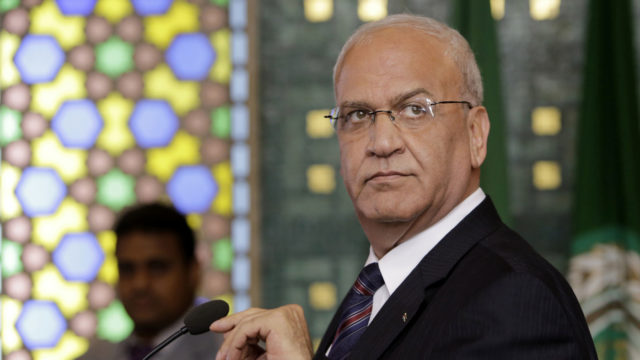
The death last week of Palestine Liberation Organization secretary and lead “peace” negotiator Saeb Erekat came at an unhappy moment for the leadership of the non-state entity of Palestine. After almost 50 years of hardened intransigence in negotiating with Israel for a state of its own—punctuated by wars, intifadas, the ever-present threat of terrorism directed at killing civilians, and the unending indoctrination of the people under their control to hate Israel and her people—the context has shifted radically, making traditional expectations of victory unlikely.
Several Gulf Arab states which formerly supported the Palestinians, politically and financially, and declined to recognize Israel’s existence, have joined the U.S.-led “Abraham Accords,” and have begun actively normalizing economic and diplomatic relations with Israel, apparently with great and pent up enthusiasm.
In response to Palestinian leadership’s predictable criticism of this step toward regional normalization, alleging betrayal and worse, spokesmen from UAE, Bahrain, and elsewhere have expressed a combination of ennui and frustration with Palestinian leaders who, true to Abba Eban’s bon mot half a century ago, “have never missed an opportunity to miss an opportunity.” In his 30 years of blustery “diplomacy,” Erekat’s most famous missed opportunity was during the Oslo talks in the 1990s, when Israel went further in offering land and concessions than made sense for its own safety. And still Yasser Arafat could not say yes to the deal.
At some point, deals expire. Windows close. Realities change.
It is only natural that leaders of sovereign Arab nations are interested in moving toward a peaceful future, in which normal economic development and commerce will provide a living for their people that oil no longer can. The Palestinian demand for subsidizing unending conflict, domestic corruption, and failure to build a decent life for their people, is too great a cost for Arab leaders who wish to live in the modern world. That is apart from the current need for a regional Arab alliance against Iran, which also backs the Palestinian Authority.
When Saeb Erekat died of COVID-19 last week, the pro-Palestinian U.S. and international media piled on the encomia and laudatory obituaries, as if he had been a head of state, or lauded opposition leader. His counterpart diplomats in the United States all penned remembrances. The sheer volume of eulogies for a man who created nothing, ran nothing, and failed in his goals—whatever one may think of them—perversely suggests that the world understands that a corner has been turned. The lavish praise for Erekat masks the fact that his goal is also buried alongside him.
Some of the obituaries in the New York Times, The Economist, CNN, NPR, etc., were tinged with sadness and reference to this failure. None mentioned that the Abraham Accords might actually bring stability and growth to the region. Nor did any give credit for this previously unimaginable breakthrough in a region previously locked in stalemate, to President Trump. Of course.
Whatever governing arrangements arise on the West Bank, they won’t be those envisioned by Erekat, his old boss at the PLO, Yasser Arafat, or the politically maladroit Mahmoud Abbas, head of the Palestinian Authority, who has gained little for his people in a long political career. For all his reported bluster, one wonders what Erekat thought about his bosses, and what they have failed to provide for 2.7 million people in the West Bank and another 1.8 million in Gaza, where the Palestinian civil war brought bifurcated government and unending misery.
Abbas, it is reported, has a net worth of $100 million, most skimmed off transfer payments from Arab and European countries. Yet a deathly ill Erekat had to go to Israel’s Hadassah Hospital, in Jerusalem. Why have successive Palestinian leaders failed to build a good hospital for their own people? It’s nice that Israel makes a point of treating its enemies and their families to the best of its medical resources. But it is embarrassing that those who would build a state, cannot build a medical center. Or much of an economy. Or the basic institutions of competent governance.
A Biden Administration has signaled its intention to move back to making the creation of a Palestinian state the center of any regional strategy. No doubt they will try. But, as they say in the Middle East, “The dogs bark, but the caravan moves on.”

